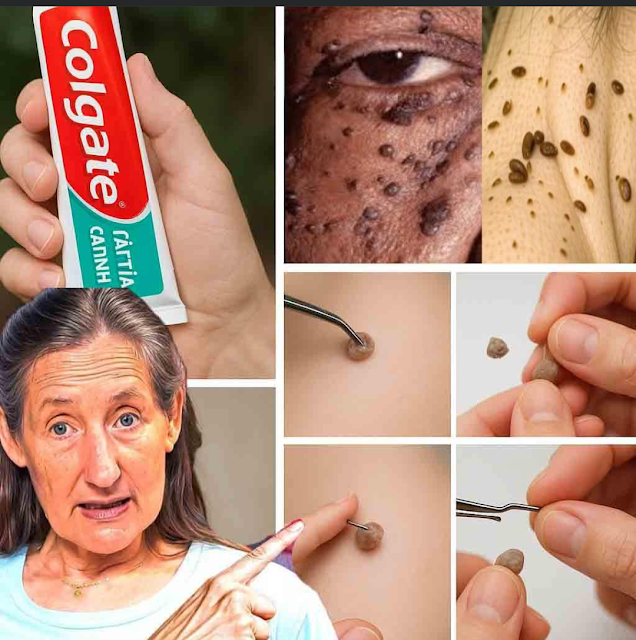Skin tags — those tiny, soft, skin-colored growths — can be annoying, especially if they show up in visible areas like the neck, underarms, or eyelids. If you’ve ever Googled home remedies, you’ve probably come across the idea of using Colgate toothpaste to remove them. But the big question is: Does it really work, or is it just another viral myth?
Let’s break it down in a fun and factual way! 💡👇
🤔 What Are Skin Tags, Exactly?
Skin tags (scientifically known as acrochordons) are non-cancerous growths of skin, often caused by friction, hormonal changes, obesity, or diabetes. They’re most common in older adults and usually pop up in skin folds.
Good news? They're harmless. Bad news? They can be a cosmetic nuisance. 😒
🧴 Why Do People Use Colgate Toothpaste on Skin Tags?
Colgate is a popular brand, and some people believe that ingredients in toothpaste like baking soda, hydrogen peroxide, or alcohol may dry out the skin tag and cause it to fall off over time.
They apply it like this:
- Clean the area.
- Apply a small amount of Colgate toothpaste directly on the skin tag.
- Cover with a bandage overnight.
- Repeat daily for several days.
Sounds easy, right? But is it safe or effective?
🚫 The Truth: Does It Actually Work?
👉 There’s no scientific evidence that Colgate or any toothpaste can remove skin tags safely or effectively.
In fact, dermatologists do not recommend using toothpaste for skin tag removal. Here's why:
⚠️ Potential Risks of Using Toothpaste:
| Issue | Explanation |
|---|---|
| Skin irritation | Toothpaste can cause burning, redness, or rashes, especially on sensitive skin. |
| No targeted action | It doesn’t address the root of the tag, like blood supply or skin cells. |
| Infection risk | Damaging the tag without sterilization may lead to infection or scarring. |
| Not FDA-approved | Toothpaste is not designed for use on skin problems. |
So basically, applying Colgate might just give you minty-smelling skin irritation rather than clear skin. 😅
✅ Safe & Effective Alternatives to Remove Skin Tags
If you’re serious about getting rid of skin tags, here are safe and proven options:
🏥 1. Medical Treatments (Recommended)
| Method | How It Works |
|---|---|
| Cryotherapy | Freezing the tag off using liquid nitrogen. |
| Cauterization | Burning off the tag with electric current. |
| Excision | Cutting it off using sterilized instruments. |
| Ligation | Tying the base of the tag to cut off blood flow. |
Visit a dermatologist to choose the right method for your skin type and location of the tag.
🪴 2. Natural Home Remedies (Mildly effective, but slower)
| Remedy | How to Use |
|---|---|
| Tea tree oil | Dab with a cotton swab twice a day until it dries out. |
| Apple cider vinegar | Soak cotton ball, apply, and leave for 15 mins daily. |
| Castor oil + baking soda | Make a paste, apply overnight for a few days. |
⚠️ Note: Even natural remedies should be tested on a small patch first to check for allergies.
🧠 Final Thoughts: Should You Use Colgate on Skin Tags?
❌ Short answer: No.
Colgate toothpaste is for your teeth — not your skin. While DIY trends on the internet can be tempting, not all are backed by science or safe to try. Using Colgate might delay proper treatment or cause unwanted irritation.
👉 If you're bothered by a skin tag, it’s best to speak with a dermatologist. They can remove it safely and without scarring.
🙋♀️ Frequently Asked Questions (FAQs)
1. Can toothpaste shrink skin tags overnight?
No. There is no proven evidence that toothpaste can shrink or remove skin tags overnight. It may irritate the skin instead.
2. Is it dangerous to cut off a skin tag at home?
Yes. Cutting it yourself can lead to bleeding, infection, or scarring. Always seek medical advice before trying DIY removal.
3. Are skin tags a sign of something serious?
Not usually. They are benign and harmless, but sudden growth or changes should be checked by a doctor.
4. Can tea tree oil remove skin tags permanently?
Tea tree oil may dry out small skin tags over time, but results vary and it can take weeks.
5. Do skin tags come back after removal?
The same one won’t return, but you may develop new ones, especially if you're prone to them due to genetics or lifestyle.
🌿 Takeaway
While using Colgate on skin tags might sound like a clever hack, it’s actually not safe or effective. Stick with dermatologist-approved treatments or gentle, natural methods — and always be kind to your skin! 💚

